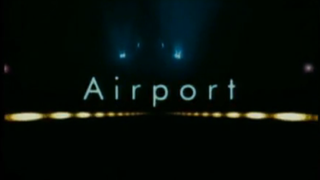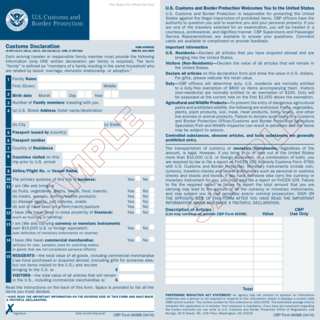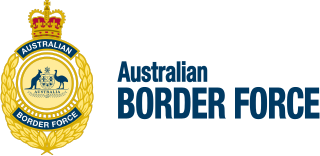
Border control comprises measures taken by governments to monitor and regulate the movement of people, animals, and goods across land, air, and maritime borders. While border control is typically associated with international borders, it also encompasses controls imposed on internal borders within a single state.

In general, a port of entry (POE) is a place where one may lawfully enter a country. It typically has border security staff and facilities to check passports and visas and to inspect luggage to assure that contraband is not imported. International airports are usually ports of entry, as are road and rail crossings on a land border. Seaports can be used as ports of entry only if a dedicated customs presence is posted there. The choice of whether to become a port of entry is up to the civil authority controlling the port.

The Canada Border Services Agency is a federal law enforcement agency that is responsible for border control, immigration enforcement, and customs services in Canada.

The Common Travel Area is an open borders area comprising the United Kingdom, Ireland, the Isle of Man and the Channel Islands. The British Overseas Territories are not included. Based on agreements that are not legally binding, the internal borders of the CTA are subject to minimal controls and can normally be traversed by British and Irish citizens with minimal identity documents. The maintenance of the CTA involves co-operation on immigration matters between the British and Irish authorities.

Airport is a British documentary television series based at London Heathrow Airport, broadcast by the BBC and syndicated to Dave, part of the UKTV network.

United States border preclearance is the United States Department of Homeland Security's (DHS) practice of operating prescreening border control facilities at airports and other ports of departure located outside of the United States pursuant to agreements between the United States and host countries. Travelers are subject to immigration and customs inspections by Customs and Border Protection (CBP) officers before boarding their transportation onward to the United States. Preclearance applies to all passengers regardless of their nationality or purpose of travel. Upon arrival, precleared passengers arrive in the United States as domestic travelers, but may still be subject to re-inspection at the discretion of CBP. This process is intended to streamline border procedures, reduce congestion at American ports of entry, and facilitate travel into airports that otherwise lack immigration and customs processing facilities for commercial flights.

Border Security: Australia's Front Line is an Australian factual television programme in the form of an observational documentary that airs on the Seven Network. The show follows the work of officers of the Department of Home Affairs, Australian Border Force, and biosecurity officers as they enforce Australian immigration, customs, quarantine and finance laws. All three of these government agencies cooperate with filming. Officers from the Australian Fisheries Management Authority and personnel from the Australian Defence Force have also appeared on the show.

A border guard of a country is a national security agency that performs border security. Some of the national border guard agencies also perform coast guard and rescue service duties.

The United Kingdom Immigration Service was the operational arm of the Home Office, Immigration and Nationality Directorate. The UK Immigration Service was, until its disbandment in 2007, responsible for the day-to-day operation of front line UK Border Controls at 57 ports "designated" under the Immigration Act 1971 including airports, seaports, the UK land-border with Ireland and the Channel Tunnel juxtaposed controls. Its in-country enforcement arm was responsible for the detection and removal of immigration offenders such as illegal entrants, illegal workers and overstayers as well as prosecutions for associated offences. On its disbandment, Immigration Service staff were re-deployed within the short lived Border and Immigration Agency which was replaced by the UK Border Agency which, in turn, was replaced by three separate entities: UK Visas and Immigration, Border Force and Immigration Enforcement, overseen by the Home Office.
An immigration officer is a law enforcement official whose job is to ensure that immigration legislation is enforced. This can cover the rules of entry for visa applicants, foreign nationals or those seeking asylum at the border, detecting and apprehending those that have breached the border and removing them, or pursuing those in breach of immigration and criminal laws.

The UK Border Agency (UKBA) was the border control agency of the Government of the United Kingdom and part of the Home Office that was superseded by UK Visas and Immigration, Border Force and Immigration Enforcement in April 2013. It was formed as an executive agency on 1 April 2008 by a merger of the Border and Immigration Agency (BIA), UKvisas and the detection functions of HM Revenue and Customs. The decision to create a single border control organisation was taken following a Cabinet Office report.

An arrival card, also known as an incoming passenger card, landing card or disembarkation card, is a legal document used by immigration authorities of many countries to obtain information about incoming passenger not provided by the passenger's passport and to provide a record of a person's entry into the country. The card may also provide information on health and character requirements for non-citizens entering the country. Some countries require an arrival card for each incoming passenger, while others require one card per family unit, and some only require an arrival card for non-citizens only.

Sovereign Base Areas Customs and Immigration is a semi-autonomous branch of HM Revenue and Customs (HMRC) of the United Kingdom. It has jurisdiction over Akrotiri and Dhekelia, a British Overseas Territory on the island of Cyprus, administered as a Sovereign Base Area, and home to British Forces Cyprus. It is managed by the Ministry of Defence (MoD) and around 3,500 military personnel are posted there at any one time.

Border Force (BF) is a British law-enforcement command within the Home Office, responsible for frontline border control operations at air, sea and rail ports in the United Kingdom. The force was part of the now defunct UK Border Agency from its establishment in 2008 until Home Secretary Theresa May demerged it in March 2012 after severe criticism of the senior management.

ePassport gates are automated self-service barriers operated by the UK Border Force and located at immigration checkpoints in arrival halls in some airports across the UK and at the juxtaposed controls in international railway terminals abroad, offering an alternative to using desks staffed by immigration officers. The gates use facial recognition technology to verify the traveller's identity against the data stored in the chip in their biometric passport, as well as run the data against numerous databases to determine if the traveller is a security risk.

The Australian Border Force (ABF) is a federal law enforcement agency, part of the Department of Home Affairs, responsible for offshore and onshore border enforcement, investigations, compliance, detention operations and customs services in Australia. Through the ABFs Marine Unit, the ABF performs Coast Guard and marine law enforcement duties and is a component of the Maritime Border Command. The ABF is also part of the National Intelligence Community and is an active member of the World Customs Organization.
Immigration Enforcement (IE) is a law enforcement command within the Home Office, responsible for enforcing immigration law across the United Kingdom. The force was part of the now defunct UK Border Agency from its establishment in 2008 until Home Secretary Theresa May demerged it in March 2012 after severe criticism of the senior management. Immigration Enforcement was formed on 1 March 2012, becoming accountable directly to ministers.
Although some means of controlling foreign visitors to the United Kingdom existed before 1905, modern immigration border controls as now understood originated then. Although an Alien Act was passed in 1793 and remained in force to some extent or other until 1836, there were no controls between then and 1905 barring a very loosely policed system of registration on entry.

Automated border control systems (ABC) or eGates are automated self-service barriers which use data stored in a chip in biometric passports along with a photo or fingerprint taken at the time of entering the eGates to verify the passport holder's identity. Travellers undergo biometric verification using facial or iris recognition, fingerprints, or a combination of modalities. After the identification process is complete and the passport holder's identity is verified, a physical barrier such as a gate or turnstile opens to permit passage. If the passport holder's identification is not verified or if the system malfunctions, then the gate or turnstile does not open and an immigration officer will meet the person. E-gates came about in the early 2000s as an automated method of reading the then-newly ICAO mandated e-passports.
















